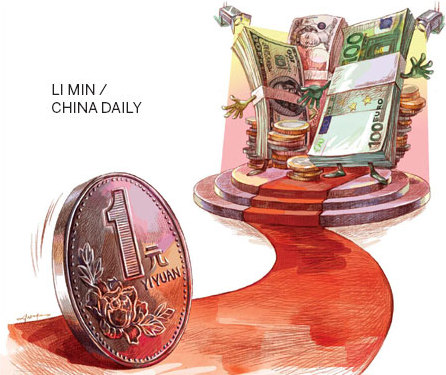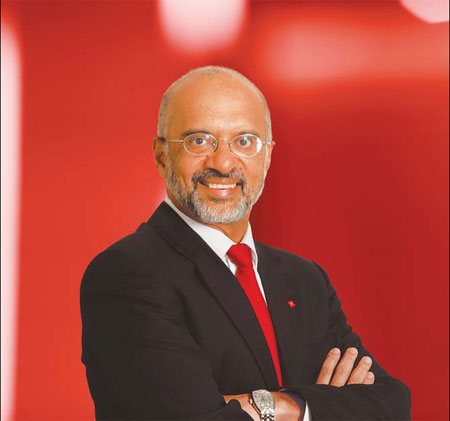Renminbi rising
Updated: 2013-07-19 09:13
By Wang Xiaotian in Beijing and Singapore, and Li Xiang in Paris (China Daily)
|
|||||||||||

|
Piyush Gupta, chief executive officer of Singapore's DBS Bank, says despite the increasing number of yuan hubs globally, the dominance of Hong Kong will not be threatened. Provided to China Daily |
|
Zhang Weiwu, general manager of ICBC's Singapore branch, says banks' product innovation will play a substantial role in promoting yuan use. Provided to China Daily |
More nations turning to Chinese currency for investment and trade settlement
Though the money markets have gone into a tizzy recently, there have been some unrelated developments that clearly underscore the growing global influence of China's currency, the renminbi or the yuan.
Indications that the renminbi is well on its way to becoming an "international" currency heightened after important currency trading centers such as Paris, Luxembourg, Frankfurt, Sydney and Dubai expressed interest in becoming offshore yuan-trading centers. Major money markets, Hong Kong, Taipei, Singapore and London, are already part of the lucrative offshore yuan-trading club.
"There is no doubt that the renminbi is gaining international recognition and that there is demand for it outside of the Chinese mainland," says Ravi Menon, managing director, Monetary Authority of Singapore. "The expansion of offshore renminbi-funding centers as well as the setting up of swap lines between the People's Bank of China and various central banks, including the latest agreement with the UK, bear evidence to this."
He says a stable and thriving Chinese economy is the best foundation on which to further the use of the yuan globally.
Zhang Lei, general manager of the global payment and clearing division at Bank of China, says: "The internationalization of the yuan has entered a critical period as yuan usage is strengthening in regions outside the Asia-Pacific."
Though there are several contenders, the European cities have the best credentials for bagging yuan deals, he says.
Growing interest
The Frankfurt-based European Central Bank is likely to enter into a swap agreement with the People's Bank of China for as much as 800 billion yuan ($130 billion; 100 billion euros), Bloomberg reported earlier this month, citing prominent lobby group Frankfurt Main Finance.
The deal, four times the 200-billion-yuan agreement signed in June between the Bank of England and PBOC, is expected to give central banks from the eurozone access to yuan funds.
"One of the major themes of the current negotiation is whether it should be mandatory for all members of the eurozone or it is only on a volunteer basis," says Philippe Mongars, deputy director of the market operation department at the Bank of France.
French President Francois Hollande said earlier that the Bank of France and the PBOC will soon reach a deal over a currency swap agreement within the framework of the ECB.
Nearly 10 percent of the commercial transactions between China and France are currently settled in yuan. Banking deposits in renminbi in Paris have amounted to about 10 billion yuan, the second largest pool of such deposits in Europe, according to Paris Europlace, a professional association that supports the French financial industry and promotes Paris as an international financial center.
Zhang, however, feels that the eagerness and readiness of Luxemburg is more obvious as it has already appointed BOC as the first yuan-clearing bank in the country in early July.
Luxemburg, the world's eighth largest financial investment center and Europe's biggest fund management center, had secured renminbi deposits of 20 billion yuan by January, the highest in the eurozone. Renminbi loans extended in Luxemburg reached 30 billion yuan, while local fund industries manage renminbi assets of 200 billion yuan.
The largest offshore renminbi center, Hong Kong, which accounts for 70 percent of overseas yuan deposits, held deposits of 698.5 billion yuan by May, according to data released by Hong Kong Monetary Authority.
"In financial terms, Luxembourg is even more important than Paris or London," says Nicolas Mackel, chief executive of Luxembourg for Finance, an agency that promotes Luxembourg as an international financial center. "We consider ourselves as a European hub especially in financial services. We don't do trading financing in that sense. But there are other services relating to renminbi that we could focus on."
More than half of Chinese investment in Europe gets structured through Luxembourg, and the increasing presence of Chinese banks will also give his country an edge, Mackel says.
Luxembourg is already the European headquarters of BOC and Industrial and Commercial Bank of China. China's Construction Bank, the second-largest Chinese lender, will soon open its European headquarters there.
Joachim Nagel, member of the executive board of the Deutsche Bundesbank, says the strong trading position between Germany and China has generated enough momentum for setting up an offshore yuan-trading center in Frankfurt.
"I believe the renminbi will develop into a global reserve currency. There is intense competition in the financial world for being a part of the renminbi trading system."
He says the biggest challenge for contenders like Germany would be to initially maintain a certain amount of liquidity in Frankfurt. Major multinational companies and banks could be the "ice breaker" by bringing in the desired volumes through yuan trading.
"The renminbi is a big currency and will play a bigger role in the future. I think the market is big enough to have multiple yuan-trading centers in Europe," Nagel says.
Mongars, of the Bank of France, feels that there would not be too much competition among the major European financial centers, as the currency swap deal will serve as a back-up facility when there is a serious liquidity shortage of the yuan in the eurozone, and also negates the need for an alternative funding source.
Wim Raymaekers, head of banking market at the Society for Worldwide Interbank Financial Telecommunication, says financial institutions in the UK, France and Germany are increasingly adopting the yuan to support trade settlement by their corporate customers.
Outside of Europe, Dubai is likely to become another major offshore yuan-trading center after Taipei as it refocuses on its roles as a regional hub for trading, logistics and tourism, says a recent report published by Standard Chartered Bank.
Financial institutions in Dubai have been actively participating in yuan deals, facilitated by the 35-billion-yuan currency swap agreement signed last year between China and the United Arab Emirates. The Dubai International Financial Centre has already introduced a payment system to allow clearing and settlement in the yuan.
Peter Sun, managing director for transaction banking, Africa, at Standard Chartered, says the chances of establishing an offshore yuan center in Africa are also high. Mauritius, with a free flow of dollars and trading with other African countries, is becoming a new regional treasury center, and companies in Africa are moving there from the traditional locations such as London and Dubai, he says.
Menon, of the monetary Authority of Singapore, says: "As the use of the renminbi expands over time in the region and beyond, there will be room for more than one offshore renminbi center. Each will have its own niche and strength."
They will also play complementary roles in developing the offshore renminbi market, Menon adds.
For instance, "offshore renminbi liquidity in Singapore should be fungible with renminbi liquidity in other offshore centers. This will help ensure that surplus liquidity in one center can be channeled to meet the demands in another, thereby improving the efficiency of the overall renminbi market," he says.
Guo Tianyong, a professor at the Central University of Finance and Economics in China, says: "Major cities around the world have become increasingly vocal on opportunities from yuan business in the past few months. The recognition and acceptance of the yuan is very encouraging if we realize that internationalization of the currency is just a three-year baby."
In 2010, Beijing launched its ambitious project to float the yuan globally by allowing companies worldwide to settle their international trade in the Chinese currency.
Despite the increase of yuan centers worldwide, the dominance of Hong Kong won't be threatened, as the biggest proportion of yuan flows are still conducted through the special administrative region of China, says Piyush Gupta, chief executive officer of DBS Bank Ltd, Singapore's largest commercial bank.
Gregory Chin, a professor at York University in Toronto, says central banks, governments and private investors are seeking alternative foreign exchange reserves and investment options, and for traders, there are real cost efficiencies to be gained by shifting to yuan settlement.
Raymaekers says the internationalization of the yuan will continue to increase in the near future, albeit with some volatility.
"Based on payment transactions going over SWIFT in June 2013, we see that the yuan again rose up the ranks versus other global currencies and may actually join the list of top 10 currencies soon."
The Chinese currency is ranked 13th globally among world payment currencies, up from 20th in January 2012.
Today's Top News
List of approved GM food clarified
ID checks for express deliveries in Guangdong
Govt to expand elderly care
University asks freshmen to sign suicide disclaimer
Tibet gears up for new climbing season
Media asked to promote Sino-Indian ties
Shots fired at Washington Navy Yard
Minimum growth rate set at 7%
Hot Topics
Lunar probe , China growth forecasts, Emission rules get tougher, China seen through 'colored lens', International board,
Editor's Picks

|

|

|

|

|

|







